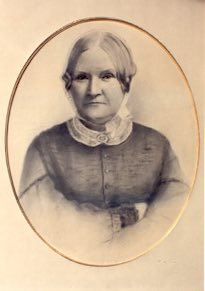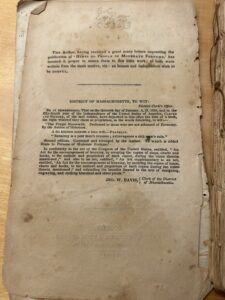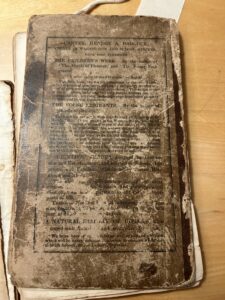The Frugal Housewife is a cookbook deeply rooted in history and activism, thanks to its author’s vocations. In addition to being a successful writer, Lydia Maria Child was a dedicated activist and abolitionist. Her published work An Appeal in Favor of that Class of Americans Called Africans was a first-of-its-kind essay that significantly impacted the perception of slavery in the United States at the time. Her other works include Hobomok: A Tale of Earlier Times, The Rebels, The Juvenile Miscellany, The Mother’s Book, and more. She mainly wrote children’s books and domestic manuals until her interest shifted to more political pursuits. After her work on An Appeal, she spent the rest of her life working towards abolishing slavery and raising awareness for the many inequalities in America. Although she was once revered in the Boston literary world, her stance on abolition left her ostracized – but that did not stop her from advocating for equality (The Poetry Foundation).

While much of her work was based on abolitionist ideals, Child was also an advocate for feminist causes and women’s rights. In addition to writing the first comprehensive history of American Slavery, she also wrote the first comprehensive history of women. The Frugal Housewife is one of her works that based in feminist ideals. The Poetry Foundation states, “Directed at “middling” and lower-class women who could not afford servants, it was an early attempt to raise domesticity to a level of competence equal to that of other skilled trades (The Poetry Foundation).” Child’s works are mostly based in equality and advocacy, and The Frugal Housewife is not an outlier.
Throughout her life, Child worked as both a writer and an editor.Since her career was strongly prevalent in the literary world, and the lack of information on the existence of a literary agent, I assume that Child did not have an agent. The front cover of the cookbook states, “Corrected and Arranged by the Author.” Child not only wrote her works, but she also edited and organized them herself.
The first cookbook to take off in America was American Cookery, or, The Art of Dressing Viands, Fish, Poultry, and Vegetables, and the Best Modes of Making Puff-Pastes, Pies, Tarts, Puddings, Custards and Preserves, and All Kinds of Cakes, from the Imperial Plumb to Plain Cake by Amelia Simmons in 1796 (Virginia Tech University). Other cookbooks began to hit the shelves in the next two to three decades, including The Female Economist, or, A Plain System of Cookery: For the Use of Families: Containing Nearly Eight Hundred Valuable Receipts byMrs. Smith (Virginia Tech University) in 1810 (World Cat), The Experienced American Housekeeper: or, Domestic Cookery, Formed on Principles of Economy for the Use of Private Families by Eliza Rundell (Virginia Tech University) in 1823 (World Cat), Five Thousand Receipts in All the Useful and Domestic Arts, Constituting a Complete and Universal Practical Library, and Operative Cyclopaedia by Colin Mackenzie (Virginia Tech University) in 1829 (World Cat). It is evident based on the titles of these cookbooks, and Child’s own work, that most cookbooks published in the early nineteenth century were focused largely on economy and domesticity.
Even with these other cookbooks published during that time, Child’s work stood out because of its ease of use, emphasis on remedies in addition to recipes, and frugality. The Frugal Housewife was a popular manual and had over 35 editions (Simon and Schuster). The cookbook’s popularity could be due to several reasons: not only was it the “first American cookbook to focus on economy in the kitchen and home (Andrews Mcmeel Publishing),” but it’s emphasis on self-reliance and frugality made it truly stand out (Andrews Mcmeel Publishing).

This edition is the fourth edition, and the main reason for this edition’s printing is stated on the third page of the book: “The Author, having received a great many letters requesting the publication of “Hints to People of Moderate Fortune,” has deemed it proper to annex them to this little work; as both were written from the same motive, viz: an honest and independent wish to be useful.” There was such high demand for the additional chapter that Child acquiesced to the request by creating this fourth edition.
On the same page as this previous note from the author, there is also a note from a JNO. W. Davis, Clerk of District of Massachusetts, that states additional reasons for the printing of this book. It states that the book is in accordance with the act(s) stating an emphasis on learning and the importance of historical prints.

The book was originally printed in Boston, Massachusetts by publishers Carter, Hendee, and Babcock. There is not much known about these publishers, but from what I could find, they printed mainly children’s books and educational texts. On the back cover of this edition of The Frugal Housewife, there is a list of other books produced by these publishers, including The Children’s Week, The Young Emigrants, Scientific Tracts, and A Natural History of Insects. Carter and Hendee published over 150 volumes at their Corner Store, and they hired Babcock for only a year (the year this book was published – 1830-1831) (Boston University). Despite the success of The Frugal Housewife, Carter and Hendee were unable to stay in business and sold their publishing company the following year (1832) (Boston University).
Information on the printer of this book is vague but based on another book published by Carter and Hendee, a printer by the name of Brattleboro Power Press Office could have been used. If not, it is possible that Carter and Hendee printed the books themselves, but this is speculative (Washington University). The paper itself has held up well structurally, although it is consistently stained on all pages. Based on the history of paper-making and the condition of the paper, I assume that it is made of rag-based materials, not wood-based. Wood-based paper was not invented until the 1840’s and was not widely used in America until over twenty years after that.
The origins of The Frugal Housewife are deeply rooted in frugality, activism, and questioning the norms of the nineteenth-century. Child’s experience as both a successful writer and activist were crucial to the success of the cookbook. Knowing the impact activism had on the writing of the cookbook, and how its emphasis on frugality led to its fame, helps acknowledge the importance of the origins of The Frugal Housewife by Lydia Maria Child.
Works Cited:
“Five Thousand Receipts in All the Useful and Domestic Arts : Constituting a Complete and Universal Practical Library, and Operative Cyclopaedia | WorldCat.org.” Worldcat.org, 2024, search.worldcat.org/title/Five-thousand-receipts-in-all-the-useful-and-domestic-arts-:-constituting-a-complete-and-universal-practical-library-and-operative-cyclopaedia/oclc/6478641. Accessed 21 Nov. 2024.
History of Papermaking around the World, paper.gatech.edu/sites/default/files/2021-04/History of Papermaking Around the World.pdf. Accessed 17 Oct. 2024.
“Looking Glass for the Mind: 350 Years of Books for Children.” Looking Glass for the Mind: 350 Years of Books for Children (an Online Exhibit), content.lib.washington.edu/exhibits/looking-glass/peter.html. Accessed 17 Oct. 2024.
“Lydia Maria Child.” NATIONAL ABOLITION HALL OF FAME AND MUSEUM, www.nationalabolitionhalloffameandmuseum.org/lydia-maria-child.html. Accessed 17 Oct. 2024.
“Lydia Maria Child.” Poetry Foundation, Poetry Foundation, www.poetryfoundation.org/poets/lydia-maria-child. Accessed 17 Oct. 2024.
Newsome, Florence Wilson. “The Publishing and Literary Activities of the Predecessors of Ticknor and Fields, 1829-1849.” Boston University Libraries OpenBU, Boston University, 1 Jan. 1970, open.bu.edu/handle/2144/7541.
“Research Guides: Food & Drink History Resources @Virginia Tech (and Beyond): Early American Cooking/Cookery (1796-1850).” Vt.edu, 2021, guides.lib.vt.edu/c.php?g=10336&p=5063149. Accessed 21 Nov. 2024.
“The Experienced American Housekeeper, Or, Domestic Cookery, Formed on Principles of Economy for the Use of Private Families | WorldCat.org.” Worldcat.org, 2024, search.worldcat.org/title/15368470. Accessed 21 Nov. 2024.
“The Female Economist, Or, a Plain System of Cookery : For the Use of Families : Containing Nearly Eight Hundred Valuable Receipts | WorldCat.org.” Worldcat.org, 2024, search.worldcat.org/title/77805720?oclcNum=77805720. Accessed 21 Nov. 2024.
“The Frugal Housewife.” Andrews McMeel Publishing, 12 Oct. 2024, publishing.andrewsmcmeel.com/book/the-frugal-housewife/#:~:text=The%20charming%20collection%20of%20recipes,is%20relevant%20in%20modern%20times.
“The Frugal Housewife.” Book by Lydia Maria Child | Official Publisher Page | Simon & Schuster, www.simonandschuster.com/books/The-Frugal-Housewife/Lydia-Maria-Child/9781449431709. Accessed 17 Oct. 2024.
Leave a Reply